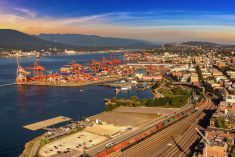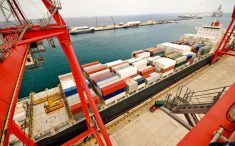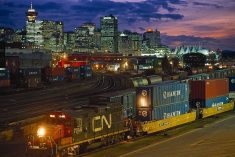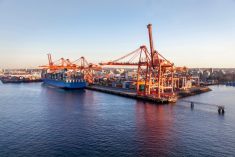MarketsFarm — Longshore workers at the Port of Vancouver have voted overwhelmingly in favour of a strike.
Members of the International Longshore and Warehouse Union (ILWU) voted 98.4 per cent in favour of strike action against the member companies of the B.C. Maritime Employers Association (BCMEA), the union said Friday.
In a letter to union members Wednesday, ILWU Local 500 president Rino Voci explained that while a strike is not necessarily imminent, it is nonetheless a valuable bargaining tool to reach a new collective bargaining agreement.
Read Also

U.S. grains: Soy futures post biggest monthly gain in nearly five years on China trade optimism
U.S. soybean futures climbed to a 15-month high and posted their biggest monthly gain in nearly five years on Friday following a rally fueled by the prospect of revived exports to China.
The workers’ most recent agreements expired at the end of March last year, and negotiations have been prolonged.
The ILWU members’ vote means a strike can be called in the next 60 days, with 72 hours’ notice to BCMEA member companies.
The BCMEA is the body representing waterfront employers in negotiating and administering collective agreements with six different union locals.
According to a 2016 economic impact study, the Port of Vancouver is the third-largest port in North America; it contributed $3.6 billion to Canada’s gross domestic product in 2018.
Over 27 million tonnes of Canadian wheat, canola, barley and other specialty crops were shipped via Vancouver in 2018. In 2016, grain alone accounted for 23 per cent of its cargo.
While a strike could cause supply chain headaches across the agriculture sector, Canada’s grains industry will remain largely unscathed, as Canada’s Labour Code deems grain to be an essential service.
Longshoremen will be required to load and ship grain, even if a strike is called for providing shipping services to other commodities.
The code states “employees and their bargaining agent shall continue to provide the services they normally provide to ensure the tie-up, let-go and loading of grain vessels at licensed terminal and transfer elevators, and the movement of grain vessels in and out of a port.”
Canadian National Railway declined to comment on the potential labour dispute or logistical consequences.
According to Business in Vancouver, long-term labour agreements between ILWU-represented port workers and maritime employers in the U.S. have put competitive pressure on the Port of Vancouver to remain open.
— Marlo Glass writes for MarketsFarm, a Glacier FarmMedia division specializing in grain and commodity market analysis and reporting.












